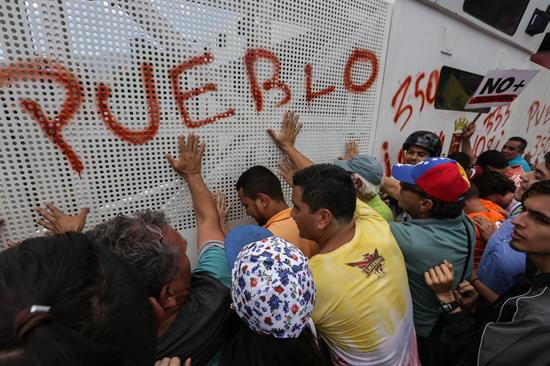6 de julio 2017

European Concern over Lack of Academic Freedom in Nicaragua

PUBLICIDAD 1M
PUBLICIDAD 4D
PUBLICIDAD 5D
It’s time to invite the world to look at Venezuela in another light that doesn’t feed polarization or fall into opportunism or geopolitics.

EFE/CRISTIAN HERNÁNDEZ
There are three extremist positions which the most obstinate sectors of the opposition and the government in Venezuela seem to share. The first being that the much-needed resolution to the humanitarian crisis - and it would be absurd to deny that it exists at this point - will come from the solution to the political crisis. Such is a common stance which seems to condemn large sectors of the population to suffering, denying them humanitarian aid.
Secondly is the belief that the political settlement must undergo a kind of purifying violent experience as well as removing the other. Both parties openly legitimize violence. Finishing off the other one, no matter what it takes in a spiral of violence which is even bringing extremists, both inside and outside of Venezuela, to call for foreign military intervention on the one hand, and, on the other, to unleash greater repression against protesters.
Thirdly, the break in Venezuela’s exhausted democratic institutions. A common denominator which from the government implies disregard for what has been legally stipulated in the Constitution with regard to elections, disrespect for the State’s powers and the call for a Constitutional Assembly: Wiping the slate clean where the outcome is already being announced: a new authoritarian political system (highly recognizable by people in Nicaragua). Reversing one of the best constitutions on the continent and one of Hugo Chavez’ best legacies and the heart of Republican institutions of imposing limits on power.
Likewise, leaders of the political opposition, counting on the respective support of the US, OAS and right-wing governments within the region - the proposal seems to bet on overthrowing the Bolivarian Revolution and Hugo Chavez’s legacy with one blow. Of course, not of all this was positive, there were mistakes and setbacks, and nobody is ignoring the role of real international powers, but in wanting to wipe out social institutions, the participatory democracy framework and everything that whiffs of Chavism, some people seem adamant on returning to the rotten politics of pre-Chavez times, to the old oligarchical order and pro-US sellouts.
It is because of all of this that some of us, from the Left, have given our support to the EMERGENCY INTERNATIONAL CALL TO STOP VIOLENCE ESCALATING IN VENEZUELA. In this document, we express our solidarity with the recent call from a group of political dissidents, academics, social activists and social organizations, including former Chavez ministers and former leaders of the opposition who are activists for human rights in Venezuela. They propose a democratic and plural dialogue, which includes different voices, not solely those sectors who have been polarized by the government and the opposition. Another kind of dialogue.
In this international statement, we state: “As Latin American citizens and citizens of other countries, we uphold a double commitment. On the one hand, our commitment is to democracy, that is to say, to a participatory democracy, which implies periodic elections, citizens on the street and extended public spaces so that decisions can be made collectively, within the community; as well as an equal democracy, which implies extending the frontier on rights, in search of a more fair society. On the other hand we have a commitment to human rights, which puts mutual respect as the laying and non-negotiable foundation, which prevents torture and deaths of our opponent, and the solution to our conflicts lying within violence.”
It’s time to invite the world to look at Venezuela in another light that doesn’t feed polarization or fall into opportunism or geopolitics where it’s easy to believe that my enemy’s enemy is my friend.
Translated by Habana Times
Archivado como:
PUBLICIDAD 3M
PUBLICIDAD 3D